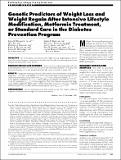| dc.contributor.author | Delahanty, Linda Michele | |
| dc.contributor.author | Pan, Qing | |
| dc.contributor.author | Jablonski, Kathleen A. | |
| dc.contributor.author | Watson, Karol E. | |
| dc.contributor.author | McCaffery, Jeanne M. | |
| dc.contributor.author | Shuldiner, Alan | |
| dc.contributor.author | Kahn, Steven E. | |
| dc.contributor.author | Knowler, William C. | |
| dc.contributor.author | Florez, Jose Carlos | |
| dc.contributor.author | Franks, Paul W. | |
| dc.date.accessioned | 2013-10-18T12:54:30Z | |
| dc.date.issued | 2012 | |
| dc.identifier.citation | Delahanty, Linda M., Qing Pan, Kathleen A. Jablonski, Karol E. Watson, Jeanne M. McCaffery, Alan Shuldiner, Steven E. Kahn, William C. Knowler, Jose C. Florez, and Paul W. Franks. 2012. Genetic predictors of weight loss and weight regain after intensive lifestyle modification, metformin treatment, or standard care in the diabetes prevention program. Diabetes Care 35(2): 363-6. | en_US |
| dc.identifier.issn | 0149-5992 | en_US |
| dc.identifier.uri | http://nrs.harvard.edu/urn-3:HUL.InstRepos:11181096 | |
| dc.description.abstract | OBJECTIVE: We tested genetic associations with weight loss and weight regain in the Diabetes Prevention Program, a randomized controlled trial of weight loss–inducing interventions (lifestyle and metformin) versus placebo. RESEARCH DESIGN AND METHODS: Sixteen obesity-predisposing single nucleotide polymorphisms (SNPs) were tested for association with short-term (baseline to 6 months) and long-term (baseline to 2 years) weight loss and weight regain (6 months to study end). RESULTS: Irrespective of treatment, the Ala12 allele at PPARG associated with short- and long-term weight loss (−0.63 and −0.93 kg/allele, P ≤ 0.005, respectively). Gene–treatment interactions were observed for short-term (LYPLAL1 rs2605100, P\(_{lifestyle*SNP}\) = 0.032; GNPDA2 rs10938397, P\(_{lifestyle*SNP}\) = 0.016; MTCH2 rs10838738, P\(_{lifestyle*SNP}\) = 0.022) and long-term (NEGR1 rs2815752, P\(_{metformin*SNP}\) = 0.028; FTO rs9939609, P\(_{lifestyle*SNP}\) = 0.044) weight loss. Three of 16 SNPs were associated with weight regain (NEGR1 rs2815752, BDNF rs6265, PPARG rs1801282), irrespective of treatment. TMEM18 rs6548238 and KTCD15 rs29941 showed treatment-specific effects (P\(_{lifestyle*SNP}\) < 0.05). CONCLUSIONS: Genetic information may help identify people who require additional support to maintain reduced weight after clinical intervention. | en_US |
| dc.language.iso | en_US | en_US |
| dc.publisher | American Diabetes Association | en_US |
| dc.relation.isversionof | doi:10.2337/dc11-1328 | en_US |
| dc.relation.hasversion | http://www.ncbi.nlm.nih.gov/pmc/articles/PMC3263869/pdf/ | en_US |
| dash.license | LAA | |
| dc.subject | Pathophysiology/Complications | en_US |
| dc.title | Genetic Predictors of Weight Loss and Weight Regain After Intensive Lifestyle Modification, Metformin Treatment, or Standard Care in the Diabetes Prevention Program | en_US |
| dc.type | Journal Article | en_US |
| dc.description.version | Version of Record | en_US |
| dc.relation.journal | Diabetes Care | en_US |
| dash.depositing.author | Florez, Jose Carlos | |
| dc.date.available | 2013-10-18T12:54:30Z | |
| dc.identifier.doi | 10.2337/dc11-1328 | * |
| dash.contributor.affiliated | Delahanty, Linda | |
| dash.contributor.affiliated | Florez, Jose | |


